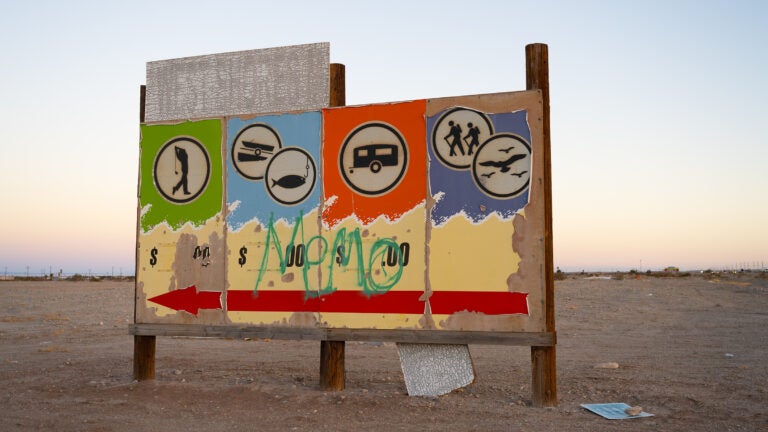Chapter 1: Cultivating hope

Near the southwest shore of the Salton Sea, a billboard greets visitors. Its brightly colored banners depict an array of activities: golf, boating, fishing, camping and nature trails. A large red arrow pointed toward the lake suggests these recreational opportunities are available nearby. Yet the billboard is tattered: fading, peeling and tagged with graffiti.
The signage is an emblem of the former resort destination's decline. In the 1950s and '60s, vacationers flocked to the Golden State's largest lake for water sports, outdoor recreation and entertainment by the likes of Frank Sinatra and the Beach Boys.
Today, the sea is shrinking, exposing areas of dusty lake bed, or playa, at its edges. The shoreline is crowded not with sunbathers but with thousands of hay bales - part of a strategy to reduce windblown dust from the playa that sickens nearby residents.
Fish bones and barnacle shells crunch underfoot. The sea's increasing salinity and toxic runoff from the region's agricultural industry have devastated marine life and made the water unsafe for human recreation. On hot, humid days, when the sea releases hydrogen sulfide gas, a "rotten egg" stink permeates the air.
In towns adjacent to the sea, where a resort "riviera" was once envisioned, run-down mobile home communities are signs of profound economic despair among the predominantly Latino community. Poverty and unemployment rates in the area exceed state averages. Opportunities beyond low-wage, seasonal work at local farms - which supply up to two-thirds of the United States' winter fruits and vegetables - are few.
Yet approximately a mile below the surface of the Salton Sea's south shore area lies a resource so sought-after that it has the potential to radically transform the area's fortunes, the sea's health - and the country's electric future.
White gold
Hot geothermal brine beneath the lake bed and surrounding areas has been identified as a rich source of lithium, a key mineral for making lithium-ion batteries used to power smartphones and electric vehicles and store solar-generated energy.
"We're moving from a fossil fuel-dependent economy to a mineral-dependent economy in which the materials that are used to make batteries are more important than ever," says Manuel Pastor, Distinguished Professor of Sociology and American Studies and Ethnicity at the USC Dornsife College of Letters, Arts and Sciences and director of the USC Equity Research Institute. "In the Salton Sea's geothermal brine, there's enough lithium to redo the entire American auto fleet to electric and still have 100 million batteries left over."
Pastor is one of several USC researchers who have trained their eyes on the region to study the problems of the past and present and the possibilities of the future. Their research, in many cases done in concert with community leaders, is helping to create a vision for an inclusive and sustainable new lithium economy - one that nurtures the growth of a profitable industry while benefiting local communities and protecting fragile ecologies.
The Imperial Valley's sizable lithium reserves have attracted several companies racing to become the first to develop a viable, scalable method for extracting the white mineral from the brine. This "white gold" rush has bestowed the area with a new nickname: Lithium Valley.
Hopes are high that the emerging lithium industry will become profitable, infuse the local economy with high-quality jobs and generate tax revenue to fund the restoration of the Salton Sea. But these outcomes are far from assured - particularly in a region that has been vulnerable to economic and environmental exploitation by industrial interests for decades.
"The microcosm of the Salton Sea region helps you get at the question, 'What does it really mean to move to a clean energy economy?'" says Pastor, who co-authored the recent book Charging Forward: Lithium Valley, Electric Vehicles, and a Just Future with Chris Benner, professor of environmental studies and sociology at the University of California, Santa Cruz. "Who will benefit from the boom - and who will face continued marginalization?"






